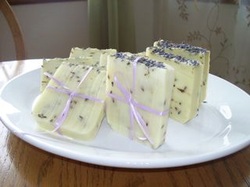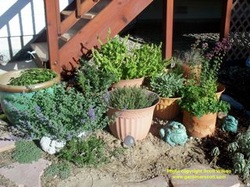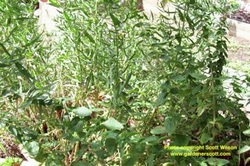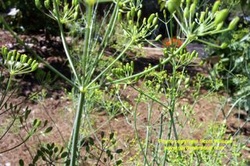A primary benefit for me personally is the culinary aspect that herbs offer. I love to cook and like to use natural ingredients. When I make a nice homemade spaghetti sauce, it's a simple chore to step to my herb garden, snip off some thyme, oregano, rosemary, and sage, and add them to the simmering sauce. For a special flavor when roasting chicken, I'll pull off some tarragon leaves and slide them under the skin before placing it in the oven. The basil is great in salads and pesto. I make tea from the mint and lemon balm (see my article "Tea in the Garden II"). When I make pickles I use my own dill.

My wife has discovered the special quality that herbs add to handmade soap and bath products (see her products at www.sudsnbuds.com). She'll make a luxurious batch of lavender soap and sprinkle lavender flowers on the top before it hardens. She has made silky soap with mint fragrance and added some of my crushed mint leaves for extra aroma and texture. Lemon balm, rosemary, and sage have found their way into her bath products. I added a new bed to the garden devoted to new herb plants specifically for her use.
Are you a cook? If you cook Italian food, plant parsley, sage, rosemary, thyme, and oregano. If you like Mexican food, go with basil, cumin, cilantro and parsley to match with the tomatoes, peppers and tomatillos in your vegetable garden. For French cooking try tarragon, chives, parsley and chervil. For Greek food grow mint, marjoram, fennel, and dill. Look in your spice cabinet and see which herb bottles are empty and grow those.
If you want to focus on making tea, start with mint, lemon balm, and chamomile. Lemon verbana, sage, anise hyssop, and lemon thyme make fragrant teas. Lavender, fennel, and rose hips can be brewed too.
Do you want to make sachets or fragrant pillows? Lavender, mint, rosemary, lemon balm and thyme will hold their aromas for a long time.
I won't spend much time on the aesthetic or medicinal values of herbs. To me, every herb can add visual interest to a garden. The colors, textures, and shapes of herb plants will benefit your landscape even if you never use the leaves, flowers, or seeds for any other purpose. As to the medicinal aspect of herbs, the uses are quite subjective with some people strong advocates of their qualities and others doubtful. If you use herbs medicinally, then growing them in your garden makes perfect sense.
By beginning the selection process with your intended use, choosing the types of plants to grow is easy. The next step is to figure out which herbs are appropriate for your garden. While most herbs can be grown in a typical garden, some do better than others. Identify the space you have to grow in and how much time you want to invest. Few of the plants take up a lot of space, so a small area can be home to many different types.
Basil grows easily from seed and is available in almost every garden center and nursery as starter plants. It will produce throughout the summer, may wilt in a the hot sun, and will die in the cold of winter. You have to plant new basil every year. Chives grow well from seeds or starter plants, but can handle the cold and will return every year in a bigger clump. You'll only need to plant once.
Cilantro, or coriander, offers two uses. The leaves are great in salsa, salads, and a number of ethnic dishes, and the seeds can be ground or used whole. The plants will die in the cold, but they produce seed graciously and grow quickly. Dill is similar, with leaves and seeds producing vibrant flavors in food. I plant my dill in a wine barrel half and new plants pop up every year from the previous season's seeds.
Thyme, tarragon, oregano, and sage will faithfully return every spring. In most Zone 5 gardens, and above, they should be considered perennial plants. Rosemary and lemon balm will return if the winter wasn't too harsh.
If you have a particular herb in mind, look at a seed packet, ask about it at a nursery, or do an online search. You might be surprised to find that it will be perennial. Even if it is considered an annual, you should be able to plant seeds or potted plants and be able to harvest during and at the end of the season.
If you don't grow herbs, consider starting. If you do grow herbs, think about adding more. Fresh, dried, or frozen, they're easy to grow and easy to use.



 RSS Feed
RSS Feed